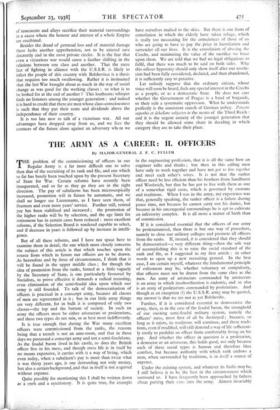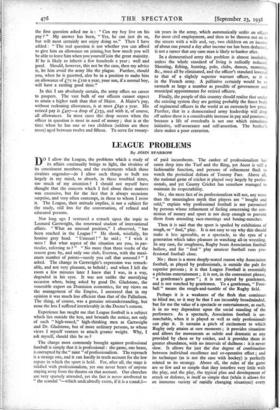THE ARMY AS A CAREER : H. OFFICERS
By MAJOR-GENERAL J. F. C. FULLER
THE problem of the commissioning of officers in our Regular Army is a far more difficult one to solve than that of the recruiting of its rank and file, and one which so far has barely been touched upon by the present Secretary of State for War. Certain reforms have recently been inaugurated, and so far as they go they are in the right direction. The pay of subalterns has been microscopically increased, promotion will in future be automatic, and we shall no longer see Lieutenants, as I have seen them, of fourteen and even more years' service. Further still, retired pay has been stabilised and increased ; the promotion of the higher ranks will be by selection, and the age limit for retirement has in certain cases been reduced : most excellent reforms, if the Selection Board is rendered capable to select, and if decrease in years is followed up by increase in intelli- gence.
But of all these reforms, and I have not space here to examine them in detail, the one which most closely concerns the subject of this article is that which touches upon the source from which in future our officers are to be drawn. As heretofore and by force of circumstances, I think that it will be found in the upper middle class ; for though the idea of promotion from the ranks, hinted at a little vaguely by the Secretary of State, is one particularly favoured by Socialists, to prove effective it demands a radical recasting, even elimination of the semi-feudal idea upon which our army is still founded. To talk of the democratisation of officers is practical in a conscript army, because all classes of men are represented in it ; but in our little army things are very different, for in bulk it is composed of only two classes—the top and the bottom of society. In such an army the officers must be either aristocrats or proletarians, and these two types do not mix, or at best most indifferently.
It is true enough that during the War many excellent officers were commissioned from the ranks, the reasons being that a trench is not an ante-room, and that in those days we possessed a conscript army and not a semi-feudal one. As the feudal baron lived in his castle, so does the British officer live in his mess, and though mess life is in itself by no means expensive, it carries with it a way of living, which even today, when a subaltern's pay is more than twice what it was thirty years ago, is one demanding not only money, but also a certain background; and that in itself is not acquired without expense.
Quite possibly for mentioning this I shall be written down as a snob and a reactionary. It is quite true, for example in the engineering profession, that it is all the same how an engineer talks and thinks ; but then in this calling men have only to work ,together and have not got to live together and meet each other's wives. It is not that the ranker officer need be less efficient than his brothers from Sandhurst and Woolwich, but that he has got to live with them as one of a somewhat rigid caste, which is governed by customs and traditions. When I was in the army, my experience was that, generally speaking, the ranker officer is a failure during peace time, not because he cannot carry out his duties, but because in his uncongenial surroundings he is apt to cultivate an inferiority complex. It is all more a matter of birth than of commission.
If it is considered essential that the officers of our army be proletarianised, then there is but one way of procedure, namely to close our military colleges and promote all officers from the ranks. If, instead, it is considered that they should be democratised—a very different thing—then the sole way of accomplishing this is to raise the social standard of the rank and file, as I suggested in my first article : in other words to open up a new recruiting ground. In the first case, I am certain myself, whatever the fundamental principle of enlistment may be, whether voluntary or compulsory, that officers must not be drawn from the same class as the men. An army of aristocrats commanded by aristocrats is an army in which insubordination is endemic, and so also is an army of proletarians commanded by proletarians. And though as an exception (?) the U.S.S.R. army may be quoted, my answer'is that we are not as yet Bolsheviks.
Further, if it is considered essential to democratise the army, then, as in the case of the feudal baron, the stronghold of our existing semi-feudal military system, namely the officers' mess, must first of all be destroyed ; because, so long as it exists, its traditions will continue, and these tradi- tions, even if modified, will still demand a way of life sufficient- ly costly to prohibit an officer from comfortably living on his pay. And whether the officer in question is a proletarian, a democrat or an aristocrat, this holds good, not only because each of these social types is human and therefore likes comfort, but because authority with which rank endows a man, when surrounded by traditions, is in itself a source of expense.
Under the existing system, and whatever its faults may be, I still believe it to be the best in the circumstances which surround us. I have frequently been approached by fathers about putting their sons into the army. Almost invariably the first question asked me is : " Can my boy live on his pay ? " My answer has been, " Yes, he can just do so, but will most certainly not enjoy doing so." Then I have added : " The real question is not whether you can afford to give him an allowance on joining, but how much you will be able to leave him when you yourself join the great majority. If he is likely to inherit a few hundreds a year ; well and good. Should, however, this not be the case, then my advice is, let him avoid the army like the plague. Further, should you, when he is gazetted, also be in a position to make him an allowance of £75 to Do° a year, your son, if a normal boy, will have a rattling good time."
In this I am absolutely certain, the army offers no career to paupers. The vast bulk of our officers cannot expect to attain a higher rank than that of Major. A Major's pay, without reckoning allowances, is at most £640 a year. His retired pay is £4o7—a drop of £233, and with it, of course, all allowances. In most cases this drop occurs when the officer in question is most in need of money ; that is at the time when he has one or two children (seldom are there more) aged between twelve and fifteen. To serve for twenty- six years in the army, which automatically unfits an officer for most civil employment, and then to be thrown out on to the streets with a wife and, say, two children on an income of about one pound a day after income tax has been deducted, is not a career that any sane man is likely to hanker after.
In a democratised army this problem is almost insoluble, unless the whole standard of living is radically reduced. Shooting, fishing, hunting, polo, clubs, dances, motoring, &c., must all be eliminated, and the officer's standard lowered to that of a slightly superior warrant officer, as it is in the French army. A palliative certainly would be to earmark as large a number as possible of government and municipal appointments for retired officers.
Finally, the people of this country should realise that under the existing system they are getting probably the finest body of regimental officers in the world at an extremely low price. Further, that in a democratised army leadership will drop off unless there is a considerable increase in pay and pensions ; because a life of overdrafts is not one which stimulates initiative, self-assurance and self-assertion. The banker's slave makes a poor centurion.







































 Previous page
Previous page